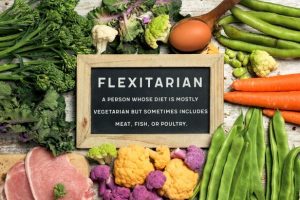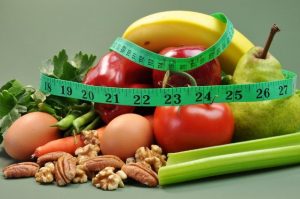Is The Flexitarian Diet Good For You And Good For The Planet?
Author: Dr. Stephen Chaney
 If you follow U.S News & World Reports, you may have noticed that the Flexitarian Diet was ranked #3, just slightly behind the Mediterranean and DASH diets. You may be scratching your head and wondering: “What is the Flexitarian Diet?” There are so many popular diets these days that it is hard to keep track. It is confusing. To paraphrase the old baseball quote: “You can’t tell the diets without a scorecard.”
If you follow U.S News & World Reports, you may have noticed that the Flexitarian Diet was ranked #3, just slightly behind the Mediterranean and DASH diets. You may be scratching your head and wondering: “What is the Flexitarian Diet?” There are so many popular diets these days that it is hard to keep track. It is confusing. To paraphrase the old baseball quote: “You can’t tell the diets without a scorecard.”
Let me provide you with that scorecard. I will describe the Flexitarian Diet and answer two important questions:
- Is the Flexitarian Diet good for you?
- Is the Flexitarian Diet good for the planet?
What Is The Flexitarian Diet?
 The term “flexitarian” was coined 10 years ago by dietitian Dawn Jackson Blatner in her book, “The Flexitarian Diet: The Mostly Vegetarian Way To Lose Weight, Be Healthier, Prevent Disease and Add Years To Your Life.” Flexitarian is simply a contraction of the phrase “flexible vegetarian.”
The term “flexitarian” was coined 10 years ago by dietitian Dawn Jackson Blatner in her book, “The Flexitarian Diet: The Mostly Vegetarian Way To Lose Weight, Be Healthier, Prevent Disease and Add Years To Your Life.” Flexitarian is simply a contraction of the phrase “flexible vegetarian.”
Blatner’s premise was two-fold:
- A vegan diet is very healthy. It is also very restrictive and hard for most people to follow.
- Allowing small amounts of meat and other animal products in a primarily vegetarian diet would preserve most of the health benefits of a vegan diet. It would also be more flexible and easier to follow.
The Flexitarian Diet has no strict rules or calorie limits. It has no prohibited foods or food groups. It is neither low-carb nor low-fat. It focuses more on what to eat than on what not to eat. It is just based on a few general principles:
- Eat mostly fruits, vegetables, legumes, and whole grains. In other words, it is a primarily plant-based diet.
- Focus on protein from plants rather than from animals.
- Be flexible and incorporate small amounts of meat and animal products in your diet. Flexibility reigns here. The diet recognizes that some people do better with more meat and animal products than others.
- Eat the least processed, most natural form of foods.
- Limit added sugars and sweets.
If you have read my book, “Slaying The Food Myths,” you know that this is essentially a semi-vegetarian diet. It is also very similar to the Mediterranean and DASH diets.
Is the Flexitarian Diet Good For You?
 As you may have guessed from the title of her book, Dawn Jackson Blatner claimed her diet would help you lose weight, get healthier, reduce your risk of diseases, and add years to your life. You might ask: “Is there any basis for her claims?”
As you may have guessed from the title of her book, Dawn Jackson Blatner claimed her diet would help you lose weight, get healthier, reduce your risk of diseases, and add years to your life. You might ask: “Is there any basis for her claims?”
The answer is “Yes,” but the evidence does not come from studies of the Flexitarian Diet. The evidence is based on similarities between the Flexitarian Diet and the semi-vegetarian diet, the Mediterranean diet, and the DASH diet.
I have covered the health benefits of these diets in detail in my book, “Slaying The Food Myths.” In summary, compared to people following the typical American diet or meat-based low-carb diets, people following these 3 diets:
- Tend to weigh less.
- Have a lower risk of diabetes and heart disease.
- Have a lower risk of some forms of cancer.
- Have lower blood pressure.
- Have less inflammation.
In addition, a paper has recently been published entitled, “Flexitarian Diets and Health: A review of the Evidence-Based Literature” (EJ Derbyshire, Frontiers In Nutrition, 3: 1-7, 2017). The title is a bit misleading in that the review did not include any studies on Flexitarian Diets (There have been none). Instead, the study reviewed 25 studies of semi-vegetarian diets published between 2000 and 2016 and relied on the fact that the Flexitarian Diet and semi-vegetarian diets are virtually identical.
The study concluded that semi-vegetarian (Flexitarian) diets:
- Resulted in weight loss.
- Improved metabolic markers (cholesterol, triglycerides, blood sugar levels).
- Lowered blood pressure.
- Reduced the risk of type-2 diabetes.
- May play a role in the management of Inflammatory bowel disease, such as Crohn’s disease.
In short, there is no direct evidence that the Flexitarian Diet is healthy. However, its similarity to semi-vegetarian, Mediterranean, and DASH diets makes it highly likely that the Flexitarian Diet is very good for you.
Is The Flexitarian Diet Good For The Planet?
 The short answer is “Yes.” More importantly, it is critical for the health of our planet that we adopt a more plant-based diet. Our current diet is not environmentally sustainable.
The short answer is “Yes.” More importantly, it is critical for the health of our planet that we adopt a more plant-based diet. Our current diet is not environmentally sustainable.
That assessment is based on four factors; Greenhouse Gas Emissions, Land Use, Water Use, and Population Growth. Here are some fast facts to ponder:
- Food production currently is responsible for:
- 40% of global land, and land conversion for food products is the single most important driver of biodiversity loss.
- Up to 30% of global greenhouse emissions.
- 70% of freshwater use.
- The population is expected to increase by 2.5 billion people between now and 2050. That raises two important issues:
- How are we going to feed those people?
- How are we going to do it in a sustainable manner?
- Ruminant animals (cattle and sheep, for example) are the worst offenders when it comes to greenhouse gas emissions. That’s because they not only breathe out CO2, but they also release methane into the atmosphere from fermentation of the food they eat in their rumens. Methane is a potent greenhouse gas, and it persists in the atmosphere 25 times longer than CO2. The single most important thing we can do as individuals to reduce greenhouse gas emissions is to eat less beef and lamb.
Two major studies have published recently that have evaluated the effect of food production on our planet.
The first study (L Aleksandrowicz et al, PLOS One, 11(11): e0165797, 2016) reviewed 63 studies that looked at the effect of dietary patterns on greenhouse gas emissions, land use, and water use. It concluded that moving from our current diet to a more plant-based diet would:
- Reduce greenhouse gas emissions and land use for food production by 70-80%.
- Reduce water use for food production by 50%.
The degree to which all these parameters could be reduced was generally proportional to the extent to which animal foods were replaced with plant foods (vegan > semi-vegetarian > Mediterranean).
The second study (W. Willet et al, The Lancet, 393, issue 10170, 447-492, 2019) was the report of the EAT-Lancet Commission on Healthy Diets from Sustainable Food Systems. This Commission convened 30 of the top experts from across the globe to prepare a science-based evaluation of the effect of diet on both health and sustainable food production through the year 2050. The Commission reviewed 356 published studies in preparing their report.
Based on an exhaustive evaluation of the literature on healthy diets and sustainable food production, the Commission recommended something they called the “Planetary Health Diet.” This science-based diet ended up being very close to the Flexitarian (semi-vegetarian) diet.
- It starts with a vegetarian diet. Vegetables, fruits, beans, nuts, soy foods, and whole grains are the foundation of the diet.
- It allows the option of adding one serving of dairy a day (It turns out that cows produce much less greenhouse emissions per serving of dairy than per serving of beef. That’s because cows take several years to mature before they can be converted to meat, and they are emitting greenhouse gases the entire time).
- It allows the option of adding one 3 oz serving of fish or poultry or one egg per day.
- It allows the option of swapping seafood, poultry, or egg for a 3 oz serving of red meat no more than once a week. If you want a 12 oz steak, that would be no more than once a month.
In other words, it is a less flexible version of the Flexitarian diet. You could also consider it a restrictive version of the Mediterranean or DASH diets.
The Commission concluded:
- “A diet that includes more plant-based foods and fewer animal source foods is healthy, sustainable, and good for both people and planet.”
- “Shifting from unhealthy diets to the ‘planetary health diet’ can prevent 11 million premature adult deaths per year and drive the transition toward a sustainable global food system by 2050 that ensures healthy food for all within planetary boundaries.”
The Bottom Line
The Flexitarian Diet has been in the news lately. You might be asking 3 questions:
- What is the Flexitarian Diet?
- Is it good for me?
- Is it good for the planet?
Here are the answers:
#1: The Flexitarian Diet is a contraction of the phrase “flexible vegetarian.” It is a vegetarian diet that allows small amounts of meat, dairy, and/or eggs. It is virtually identical to what has been called a semi-vegetarian diet for years and is very similar to the Mediterranean and DASH diets.
#2: There is no direct evidence that the Flexitarian diet is healthy. However, its close similarity to the semi-vegetarian, Mediterranean, and DASH diets makes it highly probable that the Flexitarian Diet is a healthy diet. It is likely to be good for you.
#3: When greenhouse gas emissions, land & water use, and population growth are all taken into account, experts have concluded that the only sustainable diet is a semi-vegetarian diet in which meat, dairy, and eggs are severely restricted (details in the article above). You can think of it as a less flexible version of the Flexitarian diet or a very restrictive form of the Mediterranean or DASH diets.
According to these experts, controlling carbon emissions from fossil fuels is not enough. We also must change what we eat if we wish to avoid catastrophic global warming.
For more details read the article above.
These statements have not been evaluated by the Food and Drug Administration. This information is not intended to diagnose, treat, cure or prevent any disease.
